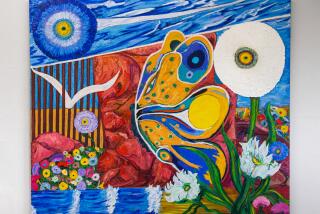Butterflies Are Free . . . to Mark Territory
- Share via
Since Dick Whittinghill retired from his perch after 30 years on the airwaves of Los Angeles at KMPC, his listeners have lost a witty, provocative, exasperating and sometimes outrageous voice. Radio just isn’t as much fun.
For the past few years Whittinghill has been living in serene retirement, “reading, watching movies on TV and drinking,” according to his own account. So I was surprised the other day to receive a phone call from him.
He said he had had what he evidently considered a transcendental experience, and he wondered what it meant. He said he often went out into his back yard to enjoy the flowers, and several times in the past few weeks a butterfly had landed on his hand. “Does that mean anything?” he asked.
“What kind of butterfly?” I asked, not being able to think of anything else to say.
“Sometimes it’s orange,” he said, “and sometimes it’s purple.”
Whittinghill wondered whether the butterflies were just doing something that came naturally, or whether he had some metaphysical attraction for some species of the order Lepidoptera.
I told him I didn’t know. We have many butterflies on Mt. Washington, but I couldn’t remember that any had ever landed on my hand. I remembered that once when I was a small boy a butterfly landed on my outstretched finger, and I regarded it, wonderingly, until it flew away. Perhaps since then I had lost some quality that attracted butterflies; I know that I have lost some qualities that used to attract other creatures.
I called Julian Donahue, the Natural History Museum lepidopterist, who is a neighbor on our hill and once came by our house to identify our moths. Donahue told me it wasn’t unusual for butterflies to land on people’s hands, especially if they were outstretched.
He said it was territorial. Like other animals, butterflies have territories, and they are likely to mark them, especially on the perimeter, by alighting on some prominent object.
Donahue said the butterfly Whittinghill described as purple was probably the mourning cloak, which is a very dark brown with a yellow margin. “They’re having a good year,” he said. “Rather abundant.”
I said, “I wonder why Whittinghill thought it was purple.”
“That might depend,” said Donahue, having been informed of Whittinghill’s vacation routine, “on how much he’d had to drink.”
Whittinghill hadn’t said anything about drinking in the daytime, and he sounded sober, so I suppose it was simply a matter of misinterpreting light refractions.
Donahue said that the orange butterfly Whittinghill saw was undoubtedly the gulf fritillary. Its caterpillars feed on passion vines, and it is abundant where passion vines are found. The gulf fritillary is orange with black spots on the upper side of its wings and silver spots on the underside. It is often mistaken for the monarch.
Donahue said that allowing butterflies to light on their hands was “not an unusual way for people to feel some communion with nature. It’s like feeding chipmunks in the park. It gives people a feeling of contact with the natural world. Kids love it. I suppose sensitive adults would also love it.”
Donahue said that the white butterflies Whittinghill saw were probably cabbage butterflies, so-called because their caterpillars eat cabbages and broccoli. They were accidentally introduced into Southern California about 1880.
He said the gulf fritillaries are having a good year, and ought to be much in evidence. “Marine blues are also especially abundant this year.”
It is not uncommon for butterflies to land on the hands or bodies of people out barbecuing in their back yards, Donahue said. But it should not be taken as a sign of affection or a hostile act. The butterfly, probably a male, is marking his territorial boundaries.
So Whittinghill is free to go back to his reading, TV movies and drinking, without feeling that he has been drawn into some mystical affinity with butterflies; he is merely an instrument of their territorial instincts.
On the other hand, how can we really know what goes on in the heart and mind of a butterfly? Perhaps Whittinghill and his butterflies are indeed on some common wavelength. Perhaps, in his retirement, he has acquired a freedom that butterflies know and respect. Anyway, besides reading, watching movies and drinking, he is also communing with nature.
Not a bad retirement.
More to Read
Sign up for Essential California
The most important California stories and recommendations in your inbox every morning.
You may occasionally receive promotional content from the Los Angeles Times.










